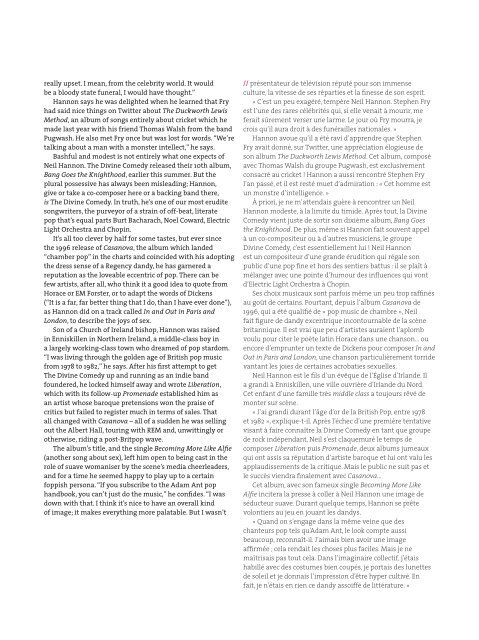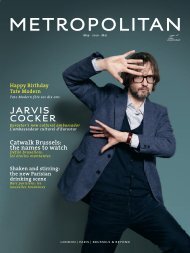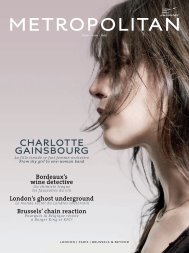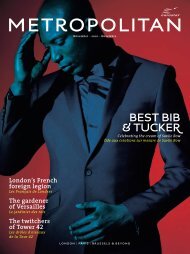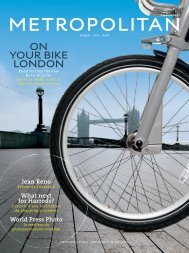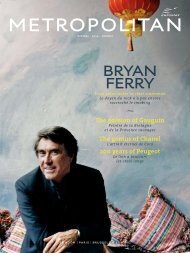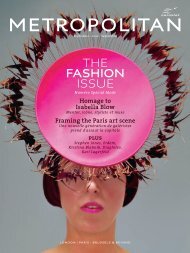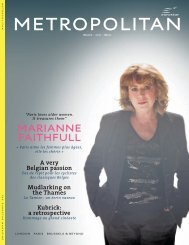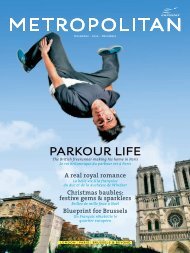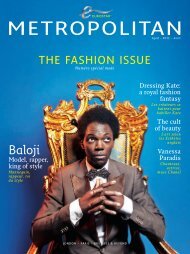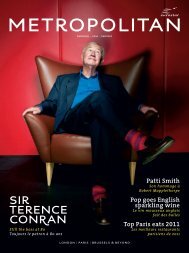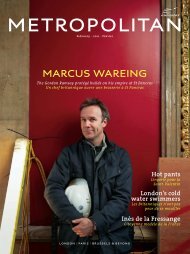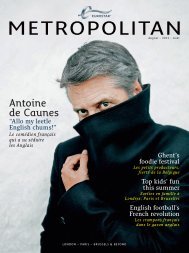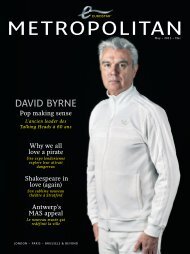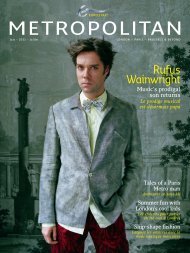july-2010
july-2010
july-2010
You also want an ePaper? Increase the reach of your titles
YUMPU automatically turns print PDFs into web optimized ePapers that Google loves.
eally upset. I mean, from the celebrity world. It would<br />
be a bloody state funeral, I would have thought.”<br />
Hannon says he was delighted when he learned that Fry<br />
had said nice things on Twitter about The Duckworth Lewis<br />
Method, an album of songs entirely about cricket which he<br />
made last year with his friend Thomas Walsh from the band<br />
Pugwash. He also met Fry once but was lost for words. “We’re<br />
talking about a man with a monster intellect,” he says.<br />
Bashful and modest is not entirely what one expects of<br />
Neil Hannon. The Divine Comedy released their 10th album,<br />
Bang Goes the Knighthood, earlier this summer. But the<br />
plural possessive has always been misleading; Hannon,<br />
give or take a co-composer here or a backing band there,<br />
is The Divine Comedy. In truth, he’s one of our most erudite<br />
songwriters, the purveyor of a strain of off-beat, literate<br />
pop that’s equal parts Burt Bacharach, Noel Coward, Electric<br />
Light Orchestra and Chopin.<br />
It’s all too clever by half for some tastes, but ever since<br />
the 1996 release of Casanova, the album which landed<br />
“chamber pop” in the charts and coincided with his adopting<br />
the dress sense of a Regency dandy, he has garnered a<br />
reputation as the loveable eccentric of pop. There can be<br />
few artists, after all, who think it a good idea to quote from<br />
Horace or EM Forster, or to adapt the words of Dickens<br />
(“It is a far, far better thing that I do, than I have ever done”),<br />
as Hannon did on a track called In and Out in Paris and<br />
London, to describe the joys of sex.<br />
Son of a Church of Ireland bishop, Hannon was raised<br />
in Enniskillen in Northern Ireland, a middle-class boy in<br />
a largely working-class town who dreamed of pop stardom.<br />
“I was living through the golden age of British pop music<br />
from 1978 to 1982,” he says. After his fi rst attempt to get<br />
The Divine Comedy up and running as an indie band<br />
foundered, he locked himself away and wrote Liberation,<br />
which with its follow-up Promenade established him as<br />
an artist whose baroque pretensions won the praise of<br />
critics but failed to register much in terms of sales. That<br />
all changed with Casanova – all of a sudden he was selling<br />
out the Albert Hall, touring with REM and, unwittingly or<br />
otherwise, riding a post-Britpop wave.<br />
The album’s title, and the single Becoming More Like Alfi e<br />
(another song about sex), left him open to being cast in the<br />
role of suave womaniser by the scene’s media cheerleaders,<br />
and for a time he seemed happy to play up to a certain<br />
foppish persona. “If you subscribe to the Adam Ant pop<br />
handbook, you can’t just do the music,” he confi des. “I was<br />
down with that. I think it’s nice to have an overall kind<br />
of image; it makes everything more palatable. But I wasn’t<br />
// présentateur de télévision réputé pour son immense<br />
culture, la vitesse de ses réparties et la fi nesse de son esprit.<br />
« C’est un peu exagéré, tempère Neil Hannon. Stephen Fry<br />
est l’une des rares célébrités qui, si elle venait à mourir, me<br />
ferait sûrement verser une larme. Le jour où Fry mourra, je<br />
crois qu’il aura droit à des funérailles nationales. »<br />
Hannon avoue qu’il a été ravi d’apprendre que Stephen<br />
Fry avait donné, sur Twitter, une appréciation élogieuse de<br />
son album The Duckworth Lewis Method. Cet album, composé<br />
avec Thomas Walsh du groupe Pugwash, est exclusivement<br />
consacré au cricket ! Hannon a aussi rencontré Stephen Fry<br />
l’an passé, et il est resté muet d’admiration : « Cet homme est<br />
un monstre d’intelligence. »<br />
À priori, je ne m’attendais guère à rencontrer un Neil<br />
Hannon modeste, à la limite du timide. Après tout, la Divine<br />
Comedy vient juste de sortir son dixième album, Bang Goes<br />
the Knighthood. De plus, même si Hannon fait souvent appel<br />
à un co-compositeur ou à d’autres musiciens, le groupe<br />
Divine Comedy, c’est essentiellement lui ! Neil Hannon<br />
est un compositeur d’une grande érudition qui régale son<br />
public d’une pop fi ne et hors des sentiers battus : il se plaît à<br />
mélanger avec une pointe d’humour des infl uences qui vont<br />
d’Electric Light Orchestra à Chopin.<br />
Ses choix musicaux sont parfois même un peu trop raffi nés<br />
au goût de certains. Pourtant, depuis l’album Casanova de<br />
1996, qui a été qualifi é de « pop music de chambre », Neil<br />
fait fi gure de dandy excentrique incontournable de la scène<br />
britannique. Il est vrai que peu d’artistes auraient l’aplomb<br />
voulu pour citer le poète latin Horace dans une chanson… ou<br />
encore d’emprunter un texte de Dickens pour composer In and<br />
Out in Paris and London, une chanson particulièrement torride<br />
vantant les joies de certaines acrobaties sexuelles.<br />
Neil Hannon est le fi ls d’un évêque de l’Église d’Irlande. Il<br />
a grandi à Enniskillen, une ville ouvrière d’Irlande du Nord.<br />
Cet enfant d’une famille très middle class a toujours rêvé de<br />
monter sur scène.<br />
« J’ai grandi durant l’âge d’or de la British Pop, entre 1978<br />
et 1982 », explique-t-il. Après l’échec d’une première tentative<br />
visant à faire connaître la Divine Comedy en tant que groupe<br />
de rock indépendant, Neil s’est claquemuré le temps de<br />
composer Liberation puis Promenade, deux albums jumeaux<br />
qui ont assis sa réputation d’artiste baroque et lui ont valu les<br />
applaudissements de la critique. Mais le public ne suit pas et<br />
le succès viendra fi nalement avec Casanova…<br />
Cet album, avec son fameux single Becoming More Like<br />
Alfi e incitera la presse à coller à Neil Hannon une image de<br />
séducteur suave. Durant quelque temps, Hannon se prête<br />
volontiers au jeu en jouant les dandys.<br />
« Quand on s’engage dans la même veine que des<br />
chanteurs pop tels qu’Adam Ant, le look compte aussi<br />
beaucoup, reconnaît-il. J’aimais bien avoir une image<br />
affi rmée ; cela rendait les choses plus faciles. Mais je ne<br />
maîtrisais pas tout cela. Dans l’imaginaire collectif, j’étais<br />
habillé avec des costumes bien coupés, je portais des lunettes<br />
de soleil et je donnais l’impression d’être hyper cultivé. En<br />
fait, je n’étais en rien ce dandy assoiffé de littérature. »


